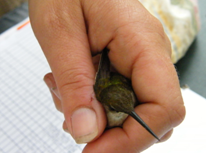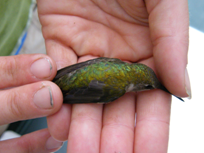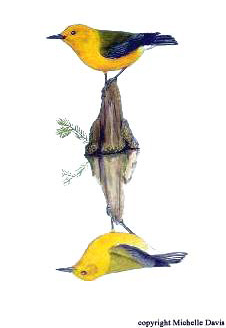
Ruby-Throated Hummingbird (Archilochus colubris) stop-over ecology
Despite much interest in the stopover ecology of intercontinental migratory birds,
little is known about resource use, including intrasexual and intersexual competition,
during stopover. . Ruby-throated Hummingbirds (Archilochus colubris) are intercontinental
migrants and represent an attractive model system to study resource use. Although
knowledge of the stopover biology of hummingbirds (Trochillidae) varies by species,
we know surprisingly little about the migration biology of Ruby-throated Hummingbird
(RTHU), the only species of hummingbirds that breeds in eastern North America. The
intercontinental migration of RTHUs has exciting "story telling" potential vis-à-vis
the importance of the stopover period in conservation biology.

My graduate research focuses on the stopover ecology of Ruby-Throated Hummingbirds
at a coastal stopover site in southwestern Louisiana. The narrow woodlands (cheniers)
along the Louisiana gulf coast are thought to provide valuable habitat for migratory
birds before and after crossing the Gulf of Mexico. . My major advisor, Frank Moore,
and his students/collaborators have studied stopover biology along the northern coast
of the Gulf of Mexico for over 20 years, which reduces the likelihood of any logistical
problems. RTHU face challenges during stopover, including the need to acquire resources
to meet energetic/nutritional demands in a short period while copying with competition
from other migrants and residents not to mention the threat of predation. RTHUs provide
an attractive model to answer questions that would otherwise be difficult to answer with
other migratory species because they are attracted to feeders by which resources can be
experimentally manipulated. In the course of my study of resource use, information will
be obtained on stopover duration, use of space, and pattern of passage in relation to
age and sex.

Other Research Interests. I have an ongoing research project with Dr. Robert Smith at
the University of Scranton, which examines the spectral plumage reflectance of breeding
Gray Catbirds (Dumetella carolinensis). This work has used feathers we collected during
the breeding season near Lackawanna State Park in Northeastern Pennsylvania. For more
information, see http://academic.scranton.edu/faculty/smithr9/undergrads.html
The
University of Southern Mississippi. Last modified:
03 March, 2010
.
Questions and
Comments?
URL: http://www.usm.edu/mbrg/jo.htm
AA/EOE/ADAI
